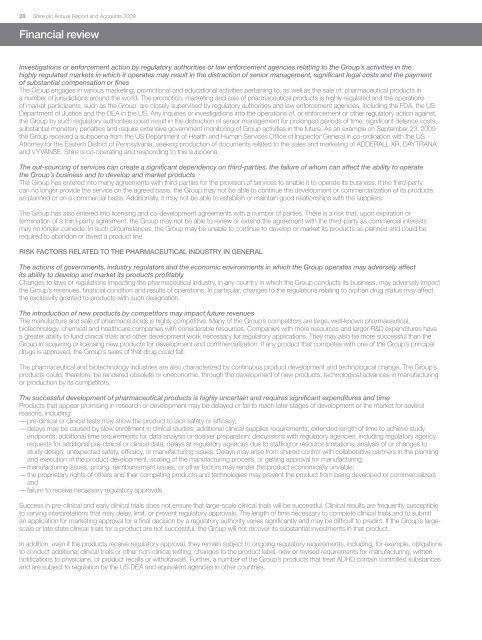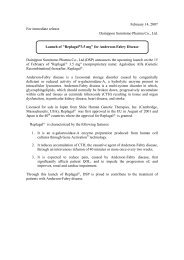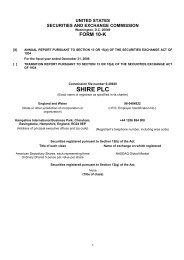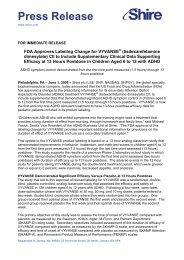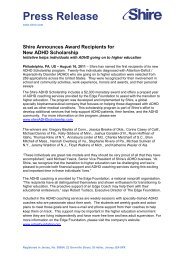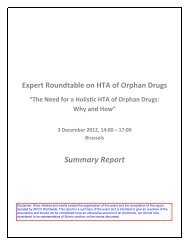28 <strong>Shire</strong> plc <strong>Annual</strong> <strong>Report</strong> and Accounts 2009Financial reviewInvestigations or enforcement action by regulatory authorities or law enforcement agencies relating to the Group’s activities in thehighly regulated markets in which it operates may result in the distraction of senior management, significant legal costs and the paymentof substantial compensation or finesThe Group engages in various marketing, promotional and educational activities pertaining to, as well as the sale of, pharmaceutical products ina number of jurisdictions around the world. The promotion, marketing and sale of pharmaceutical products is highly regulated and the operationsof market participants, such as the Group, are closely supervised by regulatory authorities and law enforcement agencies, including the FDA, the USDepartment of Justice and the DEA in the US. Any inquiries or investigations into the operations of, or enforcement or other regulatory action against,the Group by such regulatory authorities could result in the distraction of senior management for prolonged periods of time, significant defence costs,substantial monetary penalties and require extensive government monitoring of Group activities in the future. As an example on September 23, 2009the Group received a subpoena from the US Department of Health and Human Services Office of Inspector General in co-ordination with the USAttorney for the Eastern District of Pennsylvania, seeking production of documents related to the sales and marketing of ADDERALL XR, DAYTRANAand VYVANSE. <strong>Shire</strong> is co-operating and responding to this subpoena.The out-sourcing of services can create a significant dependency on third-parties, the failure of whom can affect the ability to operatethe Group’s business and to develop and market productsThe Group has entered into many agreements with third-parties for the provision of services to enable it to operate its business. If the third-partycan no longer provide the service on the agreed basis, the Group may not be able to continue the development or commercialization of its productsas planned or on a commercial basis. Additionally, it may not be able to establish or maintain good relationships with the suppliers.The Group has also entered into licensing and co-development agreements with a number of parties. There is a risk that, upon expiration ortermination of a third-party agreement, the Group may not be able to renew or extend the agreement with the third-party as commercial interestsmay no longer coincide. In such circumstances, the Group may be unable to continue to develop or market its products as planned and could berequired to abandon or divest a product line.RISK FACTORS RELATED TO THE PHARMACEUTICAL INDUSTRY IN GENERALThe actions of governments, industry regulators and the economic environments in which the Group operates may adversely affectits ability to develop and market its products profitablyChanges to laws or regulations impacting the pharmaceutical industry, in any country in which the Group conducts its business, may adversely impactthe Group’s revenues, financial condition and results of operations. In particular, changes to the regulations relating to orphan drug status may affectthe exclusivity granted to products with such designation.The introduction of new products by competitors may impact future revenuesThe manufacture and sale of pharmaceuticals is highly competitive. Many of the Group’s competitors are large, well-known pharmaceutical,biotechnology, chemical and healthcare companies with considerable resources. Companies with more resources and larger R&D expenditures havea greater ability to fund clinical trials and other development work necessary for regulatory applications. They may also be more successful than theGroup in acquiring or licensing new products for development and commercialization. If any product that competes with one of the Group’s principaldrugs is approved, the Group’s sales of that drug could fall.The pharmaceutical and biotechnology industries are also characterized by continuous product development and technological change. The Group’sproducts could, therefore, be rendered obsolete or uneconomic, through the development of new products, technological advances in manufacturingor production by its competitors.The successful development of pharmaceutical products is highly uncertain and requires significant expenditures and timeProducts that appear promising in research or development may be delayed or fail to reach later stages of development or the market for severalreasons, including:— pre-clinical or clinical tests may show the product to lack safety or efficacy;— delays may be caused by slow enrollment in clinical studies; additional clinical supplies requirements; extended length of time to achieve studyendpoints; additional time requirements for data analysis or dossier preparation; discussions with regulatory agencies, including regulatory agencyrequests for additional pre-clinical or clinical data; delays at regulatory agencies due to staffing or resource limitations; analysis of or changes tostudy design; unexpected safety, efficacy, or manufacturing issues. Delays may arise from shared control with collaborative partners in the planningand execution of the product development, scaling of the manufacturing process, or getting approval for manufacturing;— manufacturing issues, pricing, reimbursement issues, or other factors may render the product economically unviable;— the proprietary rights of others and their competing products and technologies may prevent the product from being developed or commercialized;and— failure to receive necessary regulatory approvals.Success in pre-clinical and early clinical trials does not ensure that large-scale clinical trials will be successful. Clinical results are frequently susceptibleto varying interpretations that may delay, limit, or prevent regulatory approvals. The length of time necessary to complete clinical trials and to submitan application for marketing approval for a final decision by a regulatory authority varies significantly and may be difficult to predict. If the Group’s largescaleor late state clinical trials for a product are not successful, the Group will not recover its substantial investments in that product.In addition, even if the products receive regulatory approval, they remain subject to ongoing regulatory requirements, including, for example, obligationsto conduct additional clinical trials or other non-clinical testing, changes to the product label, new or revised requirements for manufacturing, writtennotifications to physicians, or product recalls or withdrawals. Further, a number of the Group’s products that treat ADHD contain controlled substancesand are subject to regulation by the US DEA and equivalent agencies in other countries.
<strong>Shire</strong> plc <strong>Annual</strong> <strong>Report</strong> and Accounts 200929The failure of a strategic partner to develop and commercialize products could result in delays in approval or loss of revenueThe Group enters into strategic partnerships with other companies in areas such as product development and sales and marketing. In thesepartnerships, the Group is sometimes dependent on its partner to deliver results. While these partnerships are supported by contracts, the Groupmay not exercise direct control. If a partner fails to perform or experiences financial difficulties, the Group may suffer a delay in the development,a delay in the approval or a reduction in sales or royalties of a product.The failure to secure new products or compounds for development, either through in-licensing, acquisition or internal researchand development efforts, may have an adverse impact on the Group’s future resultsThe Group’s future results will depend, to a significant extent, upon its ability to in-license, acquire or develop new products or compounds. The Groupalso expends significant resources on research and development. The failure to in-license or acquire new products or compounds, on a commerciallyviable basis, could have a material adverse effect on the Group’s financial position. The failure of these efforts to result in the development of productsappropriate for testing in human clinical trials could have a material adverse effect on the Group’s revenues, financial condition and results of operations.The Group may fail to obtain, maintain, enforce or defend the intellectual property rights required to conduct its businessThe Group’s success depends upon its ability and the ability of its partners and licensors to protect their intellectual property rights. Where possible,the Group’s strategy is to register intellectual property rights, such as patents and trademarks. The Group also relies variously on trade secrets,unpatented know-how and technological innovations and contractual arrangements with third-parties to maintain its competitive position.Patents and patent applications covering a number of the technologies and processes owned or licensed to the Group have been granted, or arepending in various countries, including the US, Canada, major European countries and Japan. The Group intends to enforce vigorously its patent rightsand believes that its partners intend to enforce vigorously patent rights they have licensed to the Group. However, patent rights may not prevent otherentities from developing, using or commercializing products that are similar or functionally equivalent to the Group’s products or technologies. TheGroup’s patent rights may be successfully challenged in the future or laws providing such rights may be changed or withdrawn. The Group cannotassure investors that its patents and patent applications or those of its third-party manufacturers will provide valid patent protection sufficiently broadto protect the Group’s products and technology or that such patents will not be challenged, revoked, invalidated, infringed or circumvented by thirdparties.In the regular course of business, the Group is party to litigation or other proceedings relating to intellectual property rights. See Note 24 to theconsolidated financial statements for details of current patent litigation.Additionally, the Group’s products, or the technologies or processes used to formulate or manufacture those products may now, or in the future,infringe the patent rights of third-parties. It is also possible that third-parties will obtain patent or other proprietary rights that might be necessaryor useful for the development, manufacture or sale of the Group’s products. If third-parties are the first to invent a particular product or technology,it is possible that those parties will obtain patent rights that will be sufficiently broad to prevent the Group or its strategic partners from developing,manufacturing or selling its products. The Group may need to obtain licenses for intellectual property rights from others to develop, manufactureand market commercially viable products and may not be able to obtain these licenses on commercially reasonable terms, if at all. In addition, anylicensed patents or proprietary rights may not be valid and enforceable.The Group also relies on trade secrets and other un-patented proprietary information, which it generally seeks to protect by confidentiality and nondisclosureagreements with its employees, consultants, advisors and partners. These agreements may not effectively prevent disclosure of confidentialinformation and may not provide the Group with an adequate remedy in the event of unauthorized disclosure of such information. If the Group’semployees, scientific consultants or partners develop inventions or processes that may be applicable to the Group’s products under development,such inventions and processes will not necessarily become the Group’s property, but may remain the property of those persons or their employers.Protracted and costly litigation could be necessary to enforce and determine the scope of the Group’s proprietary rights. The failure to obtain ormaintain patent and trade secret protection, for any reason, could allow other companies to make competing products and reduce the Group’sproduct sales.The Group has filed applications to register various trademarks for use in connection with its products in various countries including the US andcountries in Europe and Latin America and intends to trademark new product names as new products are developed. In addition, with respectto certain products, the Group relies on the trademarks of third-parties. These trademarks may not afford adequate protection or the Group orthe third-parties may not have the financial resources to enforce any rights under any of these trademarks. The Group’s inability or the inability ofthese third-parties to protect their trademarks because of successful third-party claims to those trademarks could allow others to use the Group’strademarks and dilute their value.If a marketed product fails to work effectively or causes adverse side effects, this could result in damage to the Group’s reputation,the withdrawal of the product and legal action against the GroupUnanticipated side effects or unfavorable publicity from complaints concerning any of the Group’s products, or those of its competitors, could havean adverse effect on the Group’s ability to obtain or maintain regulatory approvals or successfully market its products. The testing, manufacturing,marketing and sales of pharmaceutical products entails a risk of product liability claims, product recalls, litigation and associated adverse publicity.The cost of defending against such claims is expensive even when the claims are not merited. A successful product liability claim against the Groupcould require the Group to pay a substantial monetary award. If, in the absence of adequate insurance coverage, the Group does not have sufficientfinancial resources to satisfy a liability resulting from such a claim or to fund the legal defense of such a claim, it could become insolvent. Product liabilityinsurance coverage is expensive, difficult to obtain and may not be available in the future on acceptable terms. Although the Group carries productliability insurance when available, this coverage may not be adequate. In addition, it cannot be certain that insurance coverage for present or futureproducts will be available. Moreover, an adverse judgement in a product liability suit, even if insured or eventually overturned on appeal, could generatesubstantial negative publicity about the Group’s products and business and inhibit or prevent commercialization of other products.Loss of highly qualified management and scientific personnel could cause the Group subsequent financial lossThe Group faces competition for highly qualified management and scientific personnel from other companies, academic institutions, governmententities and other organizations. It may not be able to successfully attract and retain such personnel. The Group has agreements with a number of itskey scientific and management personnel for periods of one year or less. The loss of such personnel or the inability to attract and retain the additional,highly skilled employees required for its activities could have an adverse effect on the Group’s business.


